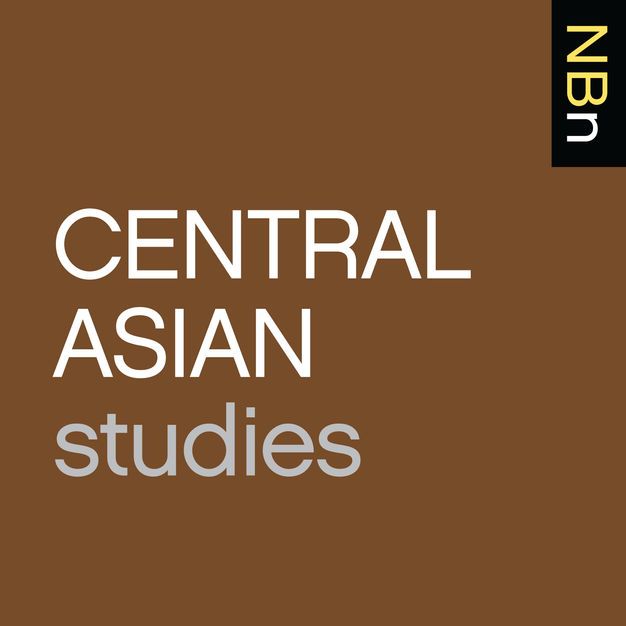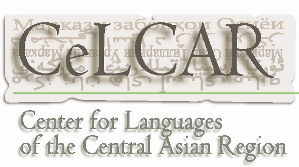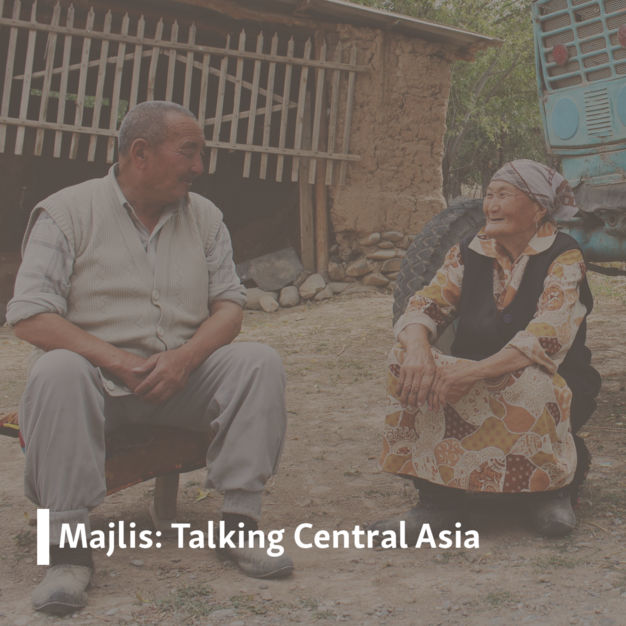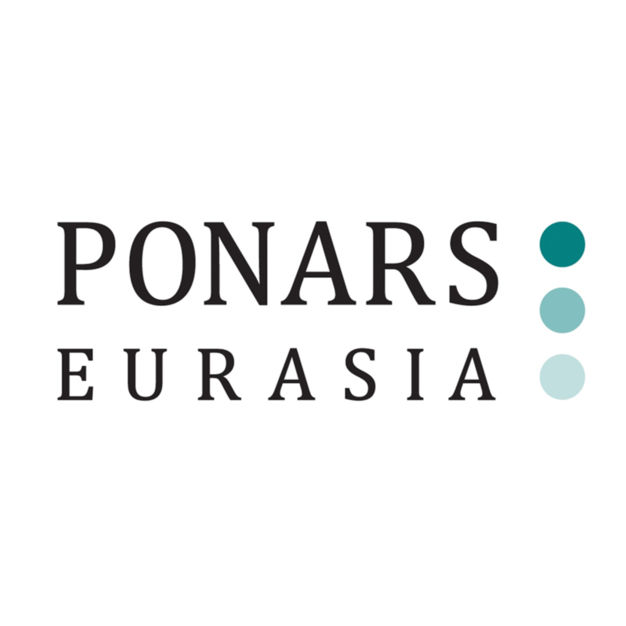
New Books in Central Asian Studies
Interviews with Scholars of Central Asia about their New Books
- 1 hour 22 minutesVicky Davis, "Central Asia in World War Two: The Impact and Legacy of Fighting for the Soviet Union" (Bloomsbury, 2023)
Central Asia in World War Two: The Impact and Legacy of Fighting for the Soviet Union (Bloomsbury, 2024) is the first book to tackle the subject of minorities fighting for the Soviet Union under Stalin in the Second World War. Based on meticulous archival research, it considers the interactions of the individual citizen and the Soviet state, weaving together the experiences of over three hundred ordinary men and women in Central Asia as they coped with their new roles on the front line or in the rear. Suffering incredible economic and physical hardship, racism and religious oppression, these mainly Muslim citizens were subjected to a forced process of Sovietization under the influence of Stalin's propaganda machine.
Davis reveals how, while conscripts were all too often slaughtered or scapegoated in their regiments, the women and children left at home slaved in factories and communal farms to fuel the machinery of a war taking place thousands of kilometres away. She convincingly argues that the impact of forced assimilation, cultural indoctrination, anti-Semitism and re-education on the region were as great as the daily fight for survival in wartime. The legacy of the period is almost as complex, with struggles over the ownership and revision of history continuing even today.
Cholpon Ramizova is a London-based writer and researcher. She holds a Master's in Migration, Mobility and Development from SOAS, University of London. Her thematic interests are in migration, displacement, identity, gender, and nationalism - and more specifically on how and which ways these intersect within the Central Asia context.
Learn more about your ad choices. Visit megaphone.fm/adchoices
Support our show by becoming a premium member! https://newbooksnetwork.supportingcast.fm/central-asian-studies
28 December 2024, 9:00 am - 1 hour 7 minutesMarianne Kamp, "Collectivization Generation: Oral Histories of a Social Revolution in Uzbekistan" (Cornell UP, 2024)
In this episode, Alisa interviews Dr. Marianne Kamp to celebrate the release of her new book, Collectivization Generation: Oral Histories of a Social Revolution in Uzbekistan, recently published by Cornell University Press. Collectivization Generation is a history of agricultural collectivization in Soviet Uzbekistan that relies on oral history accounts: we meet Uzbeks who were driven from their homes by bandits, whose fathers disappeared in the Stalinist gulag, who suffered starvation and orphanhood. We also meet Uzbeks who told of embracing the project of collectivization, of feeling rewarded with dignity, recognition, pay, association with national triumphs, and with the progress represented by a tractor.
In the interview, Dr. Kamp shares insights into her interactive approach to history, the process of collaboration, and the challenges of working with such a colossal body of narrative and putting it out into the world.
Learn more about your ad choices. Visit megaphone.fm/adchoices
Support our show by becoming a premium member! https://newbooksnetwork.supportingcast.fm/central-asian-studies
26 December 2024, 9:00 am - 1 hour 2 minutesSamuel Hodgkin, "Persianate Verse and the Poetics of Eastern Internationalism" (Cambridge UP, 2023)
At the height of literary nationalisms in the twentieth century, leftist internationalists from Turkey, Iran, Afghanistan, India, and the Soviet East bonded over their shared love of the classical Persian verses of Hafiz and Khayyam. At writers' congresses and in communist literary journals, they affirmed their friendship and solidarity with lyric ghazals and ruba'iyat. Persianate poetry became the cultural commons for a distinctively Eastern internationalism, shaping national literatures in the Soviet Union, the Middle East, and South Asia. By the early Cold War, the literary entanglement between Persianate culture and communism had established models for cultural decolonization that would ultimately outlast the Soviet imperial project. In the archive of literature produced under communism in Persian, Tajik, Dari, Turkish, Uzbek, Azerbaijani, Armenian, and Russian, this book finds a vital alternative to Western globalized world literature.
Samuel Hodgkin is Assistant Professor of Comparative Literature at Yale University. His articles have appeared in Comparative Literature Studies, Iranian Studies, Philological Encounters, Cahiers de Studia Iranica, and Cahiers d'Asie centrale.
Morteza Hajizadeh is a Ph.D. graduate in English from the University of Auckland in New Zealand. His research interests are Cultural Studies; Critical Theory; Environmental History; Medieval (Intellectual) History; Gothic Studies; 18th and 19th Century British Literature. YouTube channel. Twitter.
Learn more about your ad choices. Visit megaphone.fm/adchoices
Support our show by becoming a premium member! https://newbooksnetwork.supportingcast.fm/central-asian-studies
12 December 2024, 9:00 am - 1 hour 3 minutesVictoria Soyan Peemot, "The Horse in My Blood: Multispecies Kinship in the Altai and Saian Mountains" (Berghahn Books, 2024)
A fascinating interspecies relationship can be seen among the horse breeding pastoralists in the Altai and Saian Mountains of Inner Asia. Growing up in a community with close human-horse relationships, in The Horse in My Blood: Multispecies Kinship in the Altai and Saian Mountains (Berghahn Books, 2024), Victoria Soyan Peemot uses her knowledge of the local language and horsemanship practices. Building upon Indigenous research epistemologies, she engages with the study of how the human-horse relationships interact with each other, experience injustices and develop resilience strategies as multispecies unions.
Victoria Soyan Peemot is research fellow in Indigenous studies at the University of Helsinki supported by the Kone Foundation. Currently she is a JSPS visiting researcher at the Center for Northeast Asian Studies, Tohoku University. She is a cultural anthropologist who specialises in ethnography of mobile pastoralism in the transborder Altai and Saian Mountainous region of Inner Asia. Victoria’s research interests include Indigenous research epistemologies, human-environment relationships, and museum anthropology.
Yadong Li is a PhD student in anthropology at Tulane University. His research interests lie at the intersection of economic anthropology, medical anthropology, hope studies, and the anthropology of borders and frontiers. More details about his scholarship and research interests can be found here.
Learn more about your ad choices. Visit megaphone.fm/adchoices
Support our show by becoming a premium member! https://newbooksnetwork.supportingcast.fm/central-asian-studies
3 December 2024, 9:00 am - 1 hour 30 secondsMasha Kirasirova, "The Eastern International: Arabs, Central Asians, and Jews in the Soviet Union's Anticolonial Empire" (Oxford UP, 2024)
In the first few years after the Russian Revolution, an ideological project coalesced to link the development of what Stalin demarcated as the internal "East"—primarily Central Asia and the Caucasus—with nation-building, the overthrow of colonialism, and progress toward socialism in the "foreign East"—the Third World. Support for anti-colonial movements abroad was part of the Communist Party platform and shaped Soviet foreign policy to varying degrees thereafter.
The Eastern International: Arabs, Central Asians, and Jews in the Soviet Union's Anticolonial Empire (Oxford University Press, 2024) by Dr. Masha Kirasirova explores how the concept of "the East" was used by the world's first communist state and its mediators to project, channel, and contest power across Eurasia. Dr. Kirasirova traces how this policy was conceptualised and carried out by students, comrades, and activists—Arab, Jewish, and Central Asian. It drew on their personal motivations and gave them considerable access to state authority and agency to shape Soviet ideology, inform concrete decisions, and allocate resources. Contextualising these Eastern mediators within a global frame, this book historicizes the circulation of peoples and ideas between the socialist and decolonizing world and reinscribes Soviet history into postcolonial studies and global history.
This interview was conducted by Dr. Miranda Melcher whose new book focuses on post-conflict military integration, understanding treaty negotiation and implementation in civil war contexts, with qualitative analysis of the Angolan and Mozambican civil wars.
Learn more about your ad choices. Visit megaphone.fm/adchoices
Support our show by becoming a premium member! https://newbooksnetwork.supportingcast.fm/central-asian-studies
19 November 2024, 9:00 am - 46 minutes 34 secondsJ. Arch Getty and Lewis H. Siegelbaum, "Reflections on Stalinism" (Northern Illinois UP, 2024)
In this episode, Alisa talks with Lewis H. Siegelbaum, who, along with J. Arch Getty, edited Reflections on Stalinism (Northern Illinois University Press, 2024), a collection of essays by twelve prominent scholars in the field who, after decades of study, reflect on the 'hows' and 'whys' of Stalinism as an authoritarian dictatorship determined to build a version of socialism in the Soviet Union at all costs. The conversation explores the impetus behind the collection and its development, thematic approaches to studying Stalinism, memories of traveling to Soviet archives, and even reflections on mortality.
Other NBN episodes mentioned in this podcast include:
- Cars for Comrades: The Life of the Soviet Automobile by Lewis H. Siegelbaum, hosted by Sean Guillory;
- Stuck on Communism: Memoir of a Russian Historian by Lewis H. Siegelbaum, hosted by Steven Seegel;
- To the Success of Our Hopeless Cause: The Many Lives of the Soviet Dissident Movement by Benjamin Nathans, hosted by Marshall Poe.
Alisa Kuzmina is a PhD Candidate at the University of Minnesota, specializing in Cultural Cold War history, with a focus on Soviet and American marriage policies and the social-cultural norms surrounding them.
Learn more about your ad choices. Visit megaphone.fm/adchoices
Support our show by becoming a premium member! https://newbooksnetwork.supportingcast.fm/central-asian-studies
16 November 2024, 9:00 am - 46 minutes 49 secondsAli Igmen, "Speaking Soviet with an Accent: Culture and Power in Kyrgyzstan" (U Pittsburgh Press, 2012)
In this episode, Alisa talks with Ali İğmen, Professor of Central Asian History and the Director of the Oral History Program at California State University. In his book Speaking Soviet with an Accent: Culture and Power in Kyrgyzstan, Dr. İğmen examines Soviet Russia’s efforts to reshape local Kyrgyz culture into Soviet culture, as well as the ways in which the local Kyrgyz responded to these attempts. This is the first English-language study of Soviet culture clubs in Kyrgyzstan, which profoundly influenced the future of Kyrgyz cultural identity and helped foster the work of many artists, including the renowned novelist Chingiz Aitmatov.
The film mentioned in the episode is The First Teacher, a 1965 drama directed by Andrei Konchalovsky, based on Chinghiz Aitmatov's book of the same name.
The project Alisa refers to is Можно без политики? (Can We Do It Without Politics?) which traces the political implications of culture in an authoritarian society.
Alisa Kuzmina is a PhD Candidate at the University of Minnesota, specializing in Cultural Cold War history, with a focus on Soviet and American marriage policies and the social-cultural norms surrounding them.
Learn more about your ad choices. Visit megaphone.fm/adchoices
Support our show by becoming a premium member! https://newbooksnetwork.supportingcast.fm/central-asian-studies
13 November 2024, 9:00 am - 1 hour 13 minutesNorman Naimark, “Stalin’s Genocides” (Princeton UP, 2010)
Absolutely no one doubts that Stalin murdered millions of people in the 1920s, 1930s and 1940s. His ruthless campaign of “dekulakization,” his pitiless deportation of “unreliable” ethnic groups, his senseless starvation of Ukrainian peasants, his cruel attempt to “cleanse” the Communist Party of supposed “enemies of the people”–all of these actions resulted in mass death. In total, Stalin is responsible for the murder of roughly 10 million Soviet citizens. Again, this is well established.
What is not well established is what to call Stalin’s crimes. As Norman Naimark points out in his thought-provoking Stalin’s Genocides (Princeton UP, 2010), historians and others have been peculiarly conflicted about this issue. Everyone agrees it’s mass murder. But is it “genocide,” with all that term entails? Etymologically, it doesn’t seem so: gens is Latin for “people who claim common descent,” that is, a clan, tribe, or even nation. The Kulaks were not a gens. Historically, genocide doesn’t fit well either: after World War II, the UN decided that it would mean “acts committed with the intent to destroy, in whole or in part, a national, ethnical, racial religious group, as such.” Again, the Kulaks are none of these things.
Naimark, however, argues Stalin’s crimes should be considered genocide on three grounds. First, he demonstrates that some of Stalin’s attacks were genocide under the UN definition, for example his exile and starvation of minority ethnic groups. Second, he shows that some of those who sought to define genocide during and after World War II did not intend to restrict it to gens: they included political groups, that is, entities like the Kulaks. The Soviets and others demanded these groups be removed from the definition, and they were. Third, he demonstrates that international law has evolved, and with it the legal meaning of genocide: recent proceedings in the Baltic states, for example, have broadened the definition.
Some might ask “What does it matter what we call it?” I think it matters a lot. Words are not only an interpretation of the world, but they are also a reflection of who we are. The words the Nazis used to describe their crimes–“final solution,” “transport to the East,” “special handling”–tell us much about them. The words the Stalinists used to describe their crimes–“purge,” “evacuation,” “re-education”–tell us much about them as well. And so we have to ask: What does our persistent failure to call Stalin’s crimes “genocide” say about us? Nothing very good, I think.
Please become a fan of “New Books in History” on Facebook if you haven’t already.
Learn more about your ad choices. Visit megaphone.fm/adchoices
Support our show by becoming a premium member! https://newbooksnetwork.supportingcast.fm/central-asian-studies
9 October 2024, 8:00 pm - 1 hour 23 minutesZeev Levin, "Collectivization and Social Engineering: Soviet Administration and the Jews of Uzbekistan, 1917-1939" (Brill, 2015)
In Collectivization and Social Engineering: Soviet Administration and the Jews of Uzbekistan, 1917-1939 (Brill, 2015), Zeev Levin seeks to provide a comprehensive picture of government efforts to socialize the Jewish masses in Uzbekistan, a process in which the central Soviet government took part, together with the local, republican and regional administrations and Soviet Jewish activists. This research presents a chapter in the history of the Jews in Uzbekistan, as well as contributing to the study of the socialization process of the Jewish population in the USSR in general. It also contributes to the study of relations among political and government bodies and decision makers. The study is based on archival documents and provides a unique glance at the implementation of Soviet nationalities policy towards Bukharan Jews while comparing it to other national minority groups in Uzbekistan.
Learn more about your ad choices. Visit megaphone.fm/adchoices
Support our show by becoming a premium member! https://newbooksnetwork.supportingcast.fm/central-asian-studies
26 September 2024, 8:00 am - 56 minutes 18 secondsMichael David-Fox, "The Secret Police and the Soviet System: New Archival Investigations" (U Pittsburgh Press, 2023)
The Secret Police and the Soviet System: New Archival Investigations (U Pittsburgh Press, 2023) compiles an array of recent scholarship that draws on newly available archival evidence. This interview with the book's editor, Dr. Michael David-Fox, summarizes what these new findings add up to, and highlights specific arguments made by the collection's authors. While Russian archives are presently difficult to access, Ukrainian archives have proved to contain a trove of information about the Soviet-era secret police. The authors in this collection have broken much new interpretive ground, and the essays are universally engaging and provocative.
About the book: Even more than thirty years after the dissolution of the Soviet Union, the role of the secret police in shaping culture and society in communist USSR has been difficult to study, and defies our complete understanding. In the last decade, the opening of non-Russian KGB archives, notably in Ukraine after 2015, has allowed scholars to explore state security organizations in ways not previously possible. Moving beyond well-known cases of high-profile espionage and repression, this study is the first to showcase research from a wide range of secret police archives in former Soviet republics and the countries of the former Soviet bloc—some of which are rapidly closing or becoming inaccessible once again. Rather than focusing on Soviet leadership, The Secret Police and the Soviet System integrates the secret police into studies of information, technology, economics, art, and ideology. The result is a state-of-the-art portrait of one of the world’s most notorious institutions, the legacies of which are directly relevant for understanding Vladimir Putin’s Russia today.
Aaron Weinacht is Professor of History at the University of Montana Western, in Dillon, MT. He teaches courses on Russian and Soviet History, World History, and Philosophy of History. His research interests include the sociological theorist Philip Rieff and the influence of Russian nihilism on American libertarianism.
Learn more about your ad choices. Visit megaphone.fm/adchoices
Support our show by becoming a premium member! https://newbooksnetwork.supportingcast.fm/central-asian-studies
21 September 2024, 8:00 am - 59 minutes 24 secondsYerkebulan Sairambay, "New Media and Political Participation in Russia and Kazakhstan" (Rowman and Littlefield, 2023)
Dr. Yerkebulan Sairambay’s New Media and Political Participation in Russia and Kazakhstan (Rowman and Littlefield, 2023) confronts the sociological problem of the usage of new media (social media, the Internet, digital technologies, messaging applications) by young people in political participation. This book not only sheds light on the ways in which new media use contributes to the nature of political participation in Kazakhstan and Russia, but also explains why citizens use these tools in their civic engagement. Dr. Sairambay sets his sights on what occurs downstream, i.e., not in the minds of political leaders and/or well known oppositionists, but on the ground in specific contexts such as cities, towns, and villages by young people.
For a similar interview in the Russian language, see Dr. Sairambay’s podcast episode with the University of Tartu’s Centre for Eurasian and Russian Studies.
Cholpon Ramizova is a London-based writer and researcher. She holds a Master's in Migration, Mobility and Development from SOAS, University of London. Her thematic interests are in migration, displacement, identity, gender, and nationalism - and more specifically on how and which ways these intersect within the Central Asia context.
Learn more about your ad choices. Visit megaphone.fm/adchoices
Support our show by becoming a premium member! https://newbooksnetwork.supportingcast.fm/central-asian-studies
26 August 2024, 8:00 am - More Episodes? Get the App
Your feedback is valuable to us. Should you encounter any bugs, glitches, lack of functionality or other problems, please email us on [email protected] or join Moon.FM Telegram Group where you can talk directly to the dev team who are happy to answer any queries.
 Uyghur Language Learning Podcasts
Uyghur Language Learning Podcasts
 Uzbek Language Learning Podcasts
Uzbek Language Learning Podcasts
 Podcast: Majlis - Radio Free Europe / Radio Liberty
Podcast: Majlis - Radio Free Europe / Radio Liberty
 CREECA Lecture Series Podcast
CREECA Lecture Series Podcast
 PONARS Eurasia Podcast
PONARS Eurasia Podcast